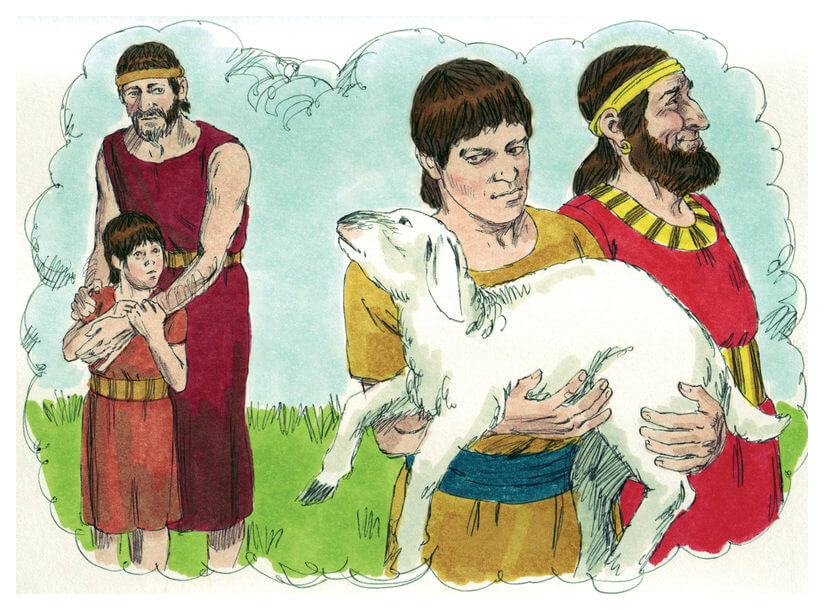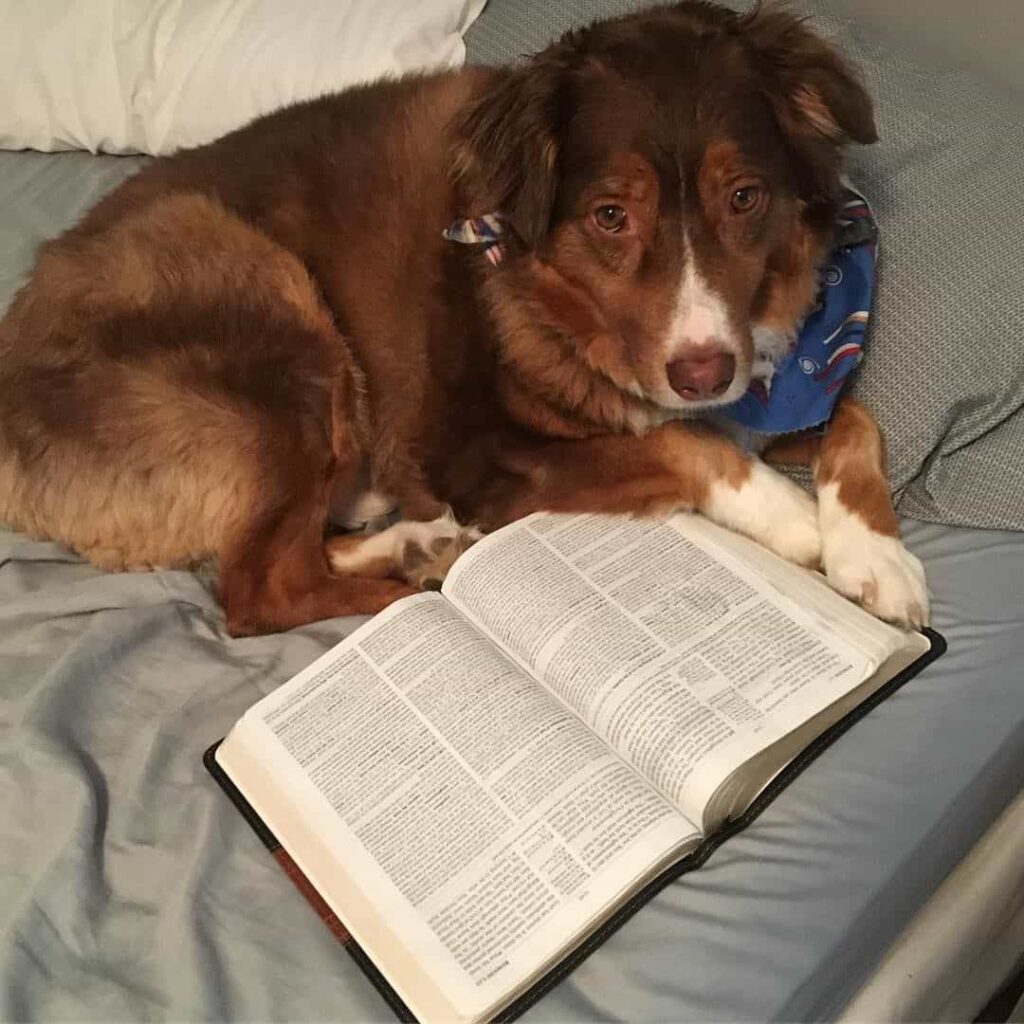American homes now house more pets than children.
Whether it is cats, goldfish, turtles, or crickets, pets have become household members with almost equal bragging rights as the rest of the family!
Given this interest in pet keeping, it’s a great time for Christian pet lovers to ask how much they should entertain pets in the house.
Is having a dog indoors in line with the Christian faith or holy life as illustrated in the bible?
Around the world, attitudes toward keeping dogs in the house have evolved over time.
Formerly domestic animals tended to be farm animals rather than pets. They were kept outdoors e.g., in enclosures.
Allowing them indoors has been influenced by changing interests where people want animals for companionship and not just for food or performing labor.
In modern times, we have developed the closest proximity to pets. We even allow them into our beds. But it wasn’t always like this.
Pets in the Garden of Eden

The Bible doesn’t address the issue of pets directly. However, from the first moment of human existence, we see humans being given a stewardship role over animals.
From the Garden of Eden, the home of the first human couple, Adam and Eve were given “dominion over the fish of the sea and over the birds of the air and over every living thing that moves upon the earth.” Genesis 1:28
It seems that Adam and Eve had their hands full with tending after animals! They must have also shared a home with animals which qualifies as letting animals into the house.
Some animals were created as wild while others were domestic according to Genesis 1:25: “God made the wild animals according to their kinds, the livestock according to their kinds, and all the creatures that move along the ground according to their kinds.”
Nathan’s Parable of the Poor Man’s Pet Lamb

One of the most striking examples of an animal that shared a close intimacy with a person in the house was given by Nathan, the prophet.
The example is about a poor man who had his ewe lamb wrongfully taken away from him by a rich man.
David who was king of Israel had conspired to have one of his most loyal soldiers, Uriah, killed so as to take his wife Bathsheba and hide the scandalous affair he had with her.
Bathsheba was also pregnant with David’s child. Uriah died and David married Bathsheba who bore his child.
Angered by this, God sent a prophet, Nathan to rebuke David and pronounce judgment for this sin.
Nathan used a parable to illustrate David’s sin, featuring a poor man who had no flock.
“He had nothing except one little ewe lamb he had bought. He raised it, and it grew up with him and his children. It shared his food, drank from his cup, and even slept in his arms. It was like a daughter to him” (2 Samuel 12:3)
This lamb was more than just a source of food, it was also a pet that lived and slept in the house.
“Now a traveler came to the rich man, but the rich man refrained from taking one of his own sheep or cattle to prepare a meal for the traveler who had come to him. Instead, he took the ewe lamb that belonged to the poor man and prepared it for the one who had come to him’
Since parables draw from existing culture, this story is a further evidence for animals living in the house.
The Case of Tobias
Another example of dogs or pets in the house is found in Tobit, a deuterocanonical book, which was written around the 2nd or 3rd century BC.
It reads in Tobit 6:2: “When the boy left home, accompanied by the angel, the dog followed Tobiah out of the house and went with them.”
This verse narrates the departure of Tobiah, son of Tobit, who leaves for a journey.
He is followed by Archangel Raphael and his dog who actually lived with him in the house.
This shows that dogs living indoors with people were an existing practice among the Jews at this time.
Dogs in the New Testament

By the time of the New Testament, pet-keeping had become more established, especially with exposure to Greek and also Roman culture.
In Mark 7:24-30 and Matthew 15:21-28, we read of the Syrophoenician woman who was a foreigner and had come to Jesus to plead for healing.
To the woman’s pleas, Jesus answered, ‘It is not good to take the children’s bread and throw it to the little dogs.’ And she said, ‘Yes, Lord, yet even the little dogs eat the crumbs which fall from their masters’ table.’
Since these dogs could enter the house and eat the fallen food remains under the table, they were pet dogs, and allowing them indoors was acceptable.
Also, the dogs had a master, which confirms they were not stray dogs but dogs owned as pets.
Dogs in the Talmud
The Talmud is an important source of information about Jewish practices from about the 1st century.
In Judaism, it’s second to the bible in significance. The Talmud teaches that pets had a practical useful function in the house.
For example, the Bava Kamma 80s states that dogs and cats help rid the house of vermin.
The Talmud even expresses a special treatment by stating that one should not feed before his animals.
Reflecting God’s Caring Character
Taking another person under your roof is to show the highest form of hospitality. To do this to animals conveys a similar attitude.
Many pets have a higher chance of survival when kept indoors than outdoors. Taking them indoors is, therefore, an act of kindness or mercy.
These acts fulfill the requirements of righteousness according to Proverbs 12: 10 ….” a righteous person takes heed of the life of his beast.”
It also mirrors God’s own compassion. Psalm 147:9 tells us that God is concerned for all His creation, including the animals He created: “He provides food for the cattle and the young ravens when they call.”
In Psalm 104:21, we see that “the lions roar for their prey and seek their food from God.”
Are Dogs a Spiritual Distraction?

Pet dogs may bring us closer to God but could they also separate us from Him?
No other generation has taken enthusiastically to pets more than ours. Letting them into our houses shows a high level of attachment that wasn’t there before.
Is it a case of too much of a good thing?
This is possible not just because we let our dogs indoors but because the sheer sums we spend on them sometimes rival what we spend on the poor among us.
But this is not different from other activities like food, fitness exercise, sports, cars, and clothes.
Excessive attention to these things can compete with prayer, study, and worship of God.
In Matthew 5:29, Jesus shows how your dearest things can cause you spiritual trouble.
“If your right eye causes you to stumble, gouge it out and throw it away. It is better for you to lose one part of your body than for your whole body to be thrown into hell.”
Jesus used the right eye metaphorically in this example to stand for anything precious that comes between a person and God.
Related:
Conclusion
Despite misgivings about dogs being in our homes, it’s safe to say they have been welcome.
So, it’s entirely in place to mention dogs and biblical values in the same breath.
Other Posts You May Enjoy:
Why did God Make Dogs’ Lives So Short?
Bible Verses about Dogs in Heaven
What is the Power of the Dog in the Bible?
What Does the Bible Say about Laying with Dogs?
As an Amazon Associate, we may receive a small commission from qualifying purchases but at no extra cost to you. Learn more. Amazon and the Amazon logo are trademarks of Amazon.com, Inc, or its affiliates.

